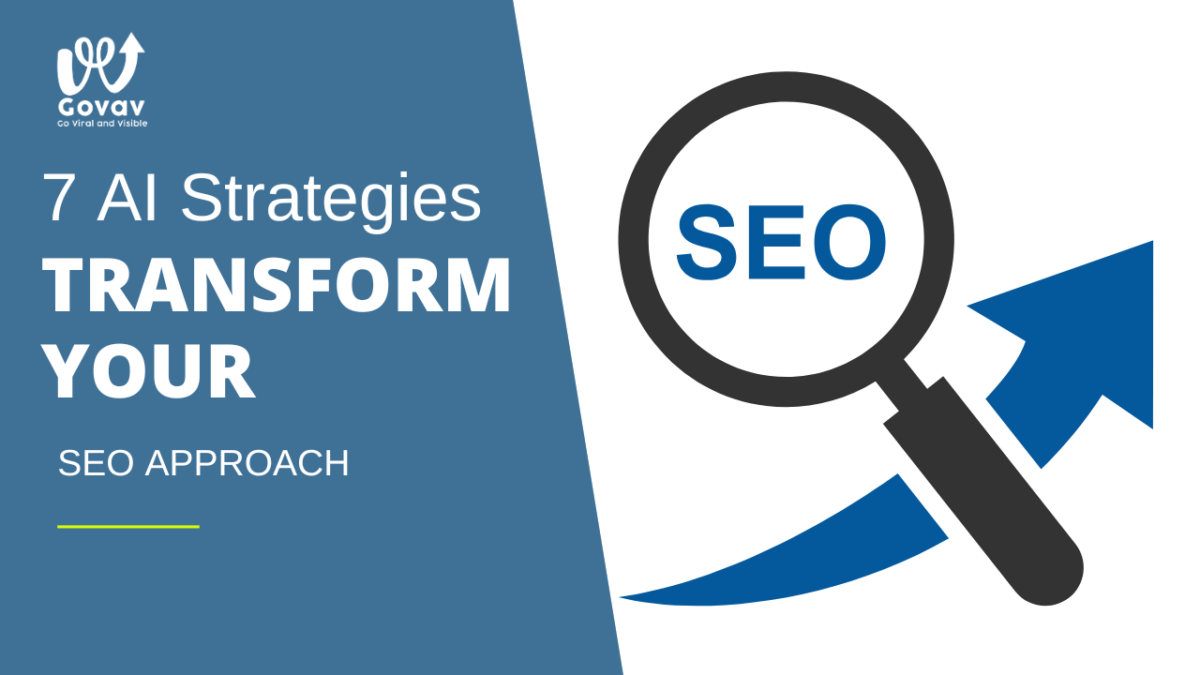
Introduction:
SEO is constantly evolving. While there are many traditional techniques like keyword research and backlinking that still work, the landscape of SEO is changing faster than ever. I’ve seen it firsthand—what used to take weeks or months of optimization now happens in just a few days, thanks to AI.
In this post, I’ll share 7 AI strategies that can completely transform your SEO approach. From keyword research to content optimization, AI is here to make your SEO efforts smarter, faster, and more effective.
The Challenge—Traditional SEO Can Be Time-Consuming and Inefficient
Before I embraced AI, I struggled with some familiar SEO challenges—finding the right keywords, analyzing competitors, and optimizing content for search engines. Traditional SEO methods felt slow, and results often came after a long waiting period.
But that all changed when I started using AI tools to automate and enhance my SEO strategies. Suddenly, I could scale my efforts, access data-driven insights, and optimize my content with precision.
7 AI Strategies to Revolutionize Your SEO
1. AI-Powered Keyword Research
Traditional keyword research involved manually combing through hundreds of keywords, analyzing their performance, and guessing which ones would drive the most traffic. Now, I use AI-driven tools like Surfer SEO and Ahrefs that not only find high-ranking keywords but also understand the user intent behind those keywords. This has helped me discover untapped long-tail keywords and optimize content based on real-time trends.
2. AI-Optimized Content Creation
Creating content that ranks well is an art, and AI has made it much easier. Tools like Frase.io and Jasper (formerly Jarvis) use AI to analyze top-ranking pages and suggest content improvements based on their structure and keyword use. I can now create content that’s not only SEO-friendly but also designed to meet the needs and expectations of my audience.
3. AI-Driven Content Optimization
Once the content is written, AI tools like Yoast SEO and Clearscope optimize the text to ensure it’s perfectly tuned for both readers and search engines. These tools suggest keyword variations, check readability, and ensure I’m covering topics in-depth. The result? Content that’s more likely to rank higher in SERPs and connect with readers.
4. Predictive Analytics with AI
AI in SEO isn’t just about optimization; it’s about predicting future trends. By using predictive analytics tools like MarketMuse, I can forecast which topics will perform best based on historical data and current market trends. This enables me to focus on content that’s likely to attract organic traffic, making my SEO efforts more strategic and forward-thinking.
5. AI-Powered Backlink Building
Link building used to be a tedious and manual process. However, AI tools like Link-able now help identify relevant backlink opportunities by analyzing competitor link profiles and the quality of available websites. AI takes the guesswork out of link building and allows me to secure high-quality backlinks efficiently.
6. User Experience (UX) and AI
Search engines like Google prioritize user experience. AI tools like ChatGPT and Hotjar help me analyze how users interact with my site, pointing out pain points and areas for improvement. By using AI to enhance my website’s UX, I can reduce bounce rates and improve my rankings by ensuring a smoother user journey.
7. AI in SEO Audits
Conducting SEO audits used to be time-consuming and complex. Now, with AI-powered tools like SEOClarity and SEMrush, I can run a full website audit in minutes. These tools analyze every aspect of my site—from technical SEO to on-page content—and offer suggestions for improvement, helping me stay on top of my SEO health without the manual effort.
Results—How AI Transformed My SEO Approach
By integrating AI into my SEO strategy, I’ve seen incredible results:
- Faster Keyword Targeting: AI’s real-time keyword analysis allowed me to focus on high-ROI terms, driving quality traffic faster.
- More Effective Content Creation: AI-powered content tools helped me create SEO-friendly articles that are in tune with user intent.
- Improved Backlink Strategy: AI tools have made link-building efforts much more efficient, securing quality backlinks that helped improve my rankings.
- Boosted User Engagement: AI-driven UX improvements have helped reduce bounce rates, leading to more conversions and higher rankings.
Conclusion:
AI is no longer just a futuristic technology—it’s here, and it’s changing the way we approach SEO. Whether it’s improving keyword research, streamlining content creation, or optimizing for user experience, AI in SEO is transforming the industry in 2024.
If you haven’t already, it’s time to embrace AI in your SEO strategy and unlock its full potential. Trust me, the results speak for themselves.
Want to see how AI can boost your SEO performance? Contact us today to schedule a consultation or explore more tips on using AI for digital marketing success.










